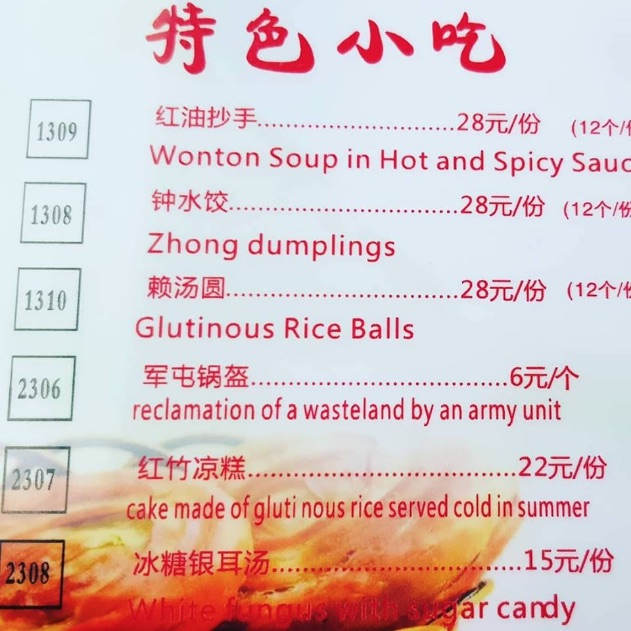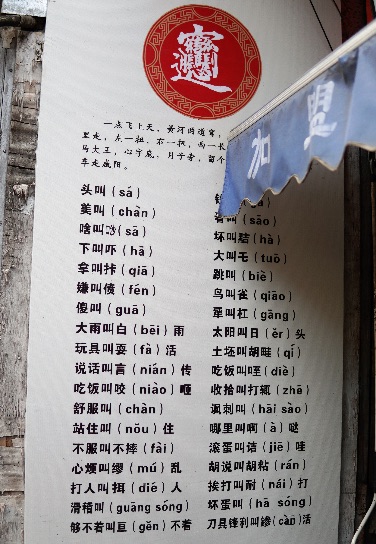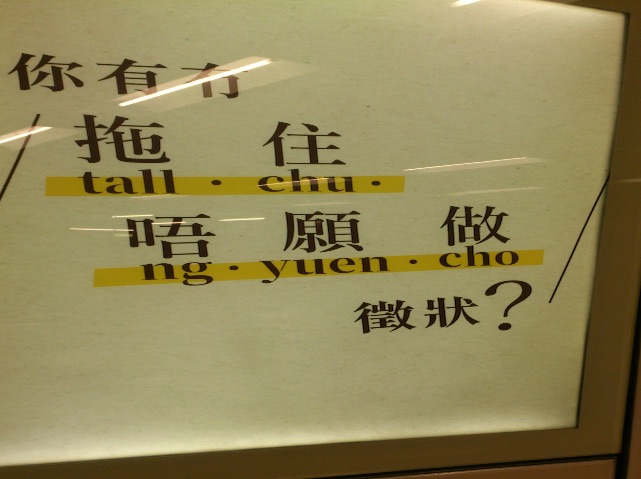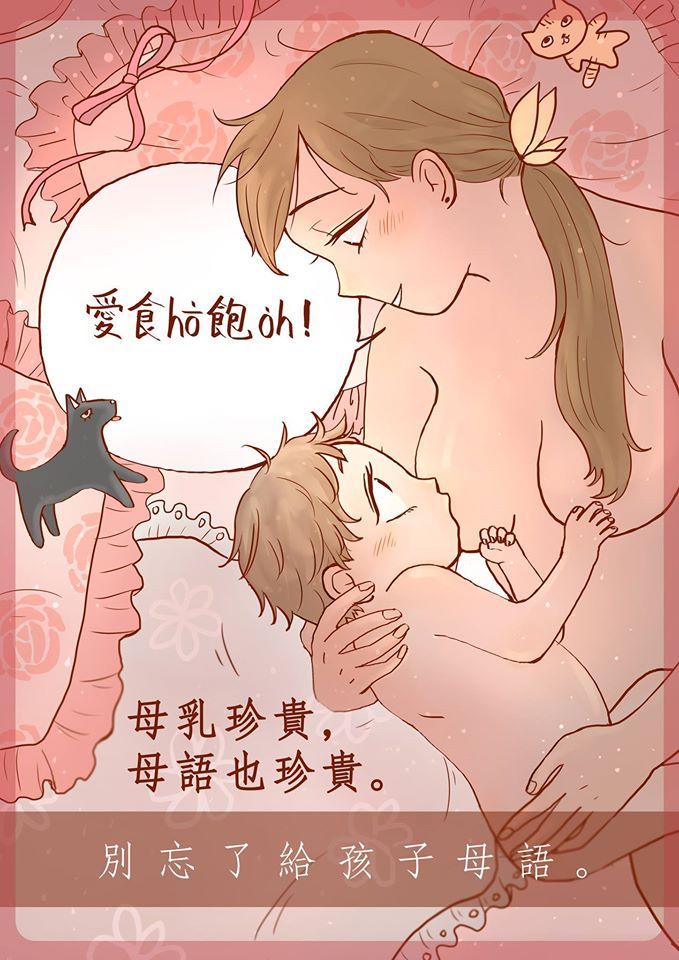Archive for Topolects
March 16, 2019 @ 8:52 am· Filed by Victor Mair under Dialects, Diglossia and digraphia, Topolects, Vernacular, Writing systems
This little clip, of sociolinguistic as well as non-linguistic interest, has gone viral in the Algerian online world (via Twitter):
https://www.youtube.com/watch?v=TGTxWCLIQNM
Read the rest of this entry »
Permalink
February 11, 2019 @ 12:10 pm· Filed by Victor Mair under Language and food, Lost in translation, Topolects
Jane Skinner received this from a friend who saw it in Chengdu, Sichuan:

Read the rest of this entry »
Permalink
February 3, 2019 @ 9:41 am· Filed by Victor Mair under Animal communication, Dialects, Topolects
When human beings hear others speaking but are unable to comprehend what is being said, to what do they compare such speech? We will gain one common characterization from this article about a prematurely dying Iraqi dialect:
"Iraqis amid Mosul's silent ruins fear the loss of a dialect", by Sam Kimball, SFGate (2/1/19)
It begins thus:
For centuries, residents of Mosul have spoken a unique form of Arabic enriched by the Iraqi city's long history as a crossroads of civilization, a singsong dialect that many now fear will die out after years of war and displacement.
Much of Mosul's Old City, where speakers of the dialect are concentrated, was completely destroyed in the war against the Islamic State group. Thousands of residents were killed in months of heavy fighting, and tens of thousands fled, taking with them the city's local patois and memories of its more cosmopolitan past.
Read the rest of this entry »
Permalink
December 31, 2018 @ 10:34 am· Filed by Victor Mair under Language and education, Language and politics, Topolects
When Great Britain handed Hong Kong over to the PRC in 1997, the communist government promised to maintain the status quo of the colony's laws, educational system, human rights, language policy, and so forth for half a century, until 2047. It has only been a little over twenty years, and already virtually all aspects of government, society, and culture are being reshaped along the lines that are operative in the PRC. Naturally, the aspect of Hong Kong life that concerns us at Language Log most are policies governing language norms and usages.
Read the rest of this entry »
Permalink
December 22, 2018 @ 10:06 am· Filed by Victor Mair under Classification, Dialects, Humor, Topolects
See, I didn't even quote the whole quip, and you already knew that this post is about Max Weinreich's ubiquitous saying: "A language is a dialect with an army and navy". It may well be the most frequently invoked formula in all of linguistics. Readers of Language Log are certainly no strangers to it, since we've written a number of posts that are about the adage or mention it prominently (see Readings below), and it is often cited in the comments, even when there is no conceivable rhyme or reason for doing so.
Actually, it wasn't Max Weinreich (1894-1969), a specialist in sociolinguistics and Yiddish, who dreamed up the army-navy quip, but — by his own testimony — someone who attended a series of his lectures and mentioned it to him after one of them. Subsequently, however, Weinreich did make a point of popularizing the saying, so it is not entirely wrong to associate it with him.
Read the rest of this entry »
Permalink
December 2, 2018 @ 4:53 pm· Filed by Victor Mair under Standard language, Topolects
[This is a guest post by C K Wang]
When we went to the primary school we were forbidden to speak Taiwanese in public. We spoke Taiwanese at home and when there were no strangers around. So people in my generation speak Taiwanese well—we have kept the mother tongue. I told stories from 西遊記* to Andrea and Clare in Taiwanese and they talked and still talk to each other in Taiwanese, though they were required to speak Mandarin at all time in school
Read the rest of this entry »
Permalink
October 17, 2018 @ 11:21 am· Filed by Victor Mair under Idioms, Language and art, Language and politics, Topolects
I learned this term from an important article by David Bandurski in today's (10/17/18) The Guardian, "China’s new diplomacy in Europe has a name: broken porcelain: Beijing’s message to Sweden and beyond – criticise us, and we’ll topple your agenda – won’t win it any hearts and minds".
The relevant Chinese expression is pèngcí 碰瓷, which literally means "bump porcelain" (think pèngpèngchē 碰碰车 ["bumper cars"]). How did pèngcí 碰瓷 ("bump porcelain") become embroiled with diplomacy and international politics?
Read the rest of this entry »
Permalink
October 13, 2018 @ 4:10 pm· Filed by Victor Mair under Language and food, Topolects, Vernacular
Here is a photograph of a paper placemat Tong Wang found in a restaurant serving Beijing dishes that is named "Sea Bowl Restaurant" (Hǎiwǎn jū 海碗居):

Read the rest of this entry »
Permalink
September 6, 2018 @ 12:21 am· Filed by Victor Mair under Topolects
Adrian Thieret spotted this poster in downtown Xi'an this summer:

Read the rest of this entry »
Permalink
August 25, 2018 @ 10:09 am· Filed by Victor Mair under Diglossia and digraphia, Language and advertising, Topolects, Transcription
Jenny Chu spotted this ad from a campaign for Nescafe currently being shown in the Hong Kong MTR:

Read the rest of this entry »
Permalink
August 20, 2018 @ 6:28 pm· Filed by Victor Mair under Ambiguity, Dialects, Topolects, Translation
Jichang Lulu reports that an eating establishment in London has chosen the name qī wèi 柒味 ("seven flavors"). This comes via Yuan Chan on Twitter:
https://twitter.com/xinwenxiaojie/status/1029832787032006663
Read the rest of this entry »
Permalink
July 4, 2018 @ 10:11 am· Filed by Victor Mair under Dialects, Language and education, Topolects
Recently there was quite a ruckus over the correct word to be used for "maternal grandmother" in second-graders' textbooks in Shanghai:
"Much Ado About Grandma: Textbook Change Sparks Linguistic Debate: Critics call ‘waipo’ to ‘laolao’ change ‘cultural hegemony’ from the north", Kenrick Davis, Sixth Tone (6/22/18)
"A debate over the word for ‘grandmother’ in China exposes a linguistic and political rift", Echo Huang and Ziyi Tang, Quartz (6/26/18)
The big controversy was over whether students should be taught to say "lǎolao 姥姥" or "wàipó 外婆", both of which mean "maternal grandmother".
Read the rest of this entry »
Permalink
June 16, 2018 @ 1:20 pm· Filed by Victor Mair under Diglossia and digraphia, Grammar, Topolects, Writing systems
Pro-Taiwanese language poster on a wall in Tainan (courtesy of Tim Clifford):

Read the rest of this entry »
Permalink




